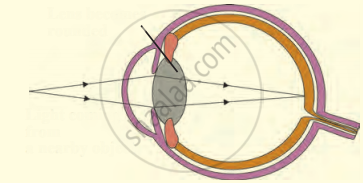Advertisements
Advertisements
Question
With reference to the functioning of the eye, answer the question that follow:
Name the cells of the retina and its respective pigments which get activated in the light.
Solution
In the light: Cells - cone cells, Pigment – iodopsin
RELATED QUESTIONS
The human eye can focus objects at different distances by adjusting the focal length of the eye lens. This is due to ______.
Night birds have ______ cones than rods in their eyes.
Explain the functions of the following parts of the eye:
(i) cornea
(ii) iris
(iii) pupil
(iv) ciliary muscles
(v) eye-lens
To focus the image of a nearby object on the retina of an eye:
(a) the distance between eye-lens and retina is increased
(b) the distance between eye-lens and retina is decreased
(c) the thickness of eye-lens is decreased
(d) the thickness of eye-lens is increased
How does the eye change in order to focus on near or distant objects?
(a) The lens moves in or out
(b) The retina moves in or out
(c) The lens becomes thicker or thinner
(d) The pupil gets larger or smaller
Why does the eye-lens not have to do all the work of converging incoming light rays?
Explain clearly why, a person who has lost the sight of one eye is at a disadvantage compared with the normal person who has two good eyes.
The region in the eyes where the rods and cones are located is the
Mention if the following statement is true (T) or false (F) Give reason.
Short-sightedness and hyperopia are one and the same thing
State the main functions of the following:
Coronary Artery
Choose the correct answer.
Colour is detected by ____________
Choose the correct answer :
The rods and cones of a vertebrate retina function is to _________
Sketch and label V.S. of a human eye.
Name the following:
The focal length of the lens is altered by the contraction of which type of muscles.
Give Technical Term:
The adjustment of the eye in order to obtain a clear vision of objects at different distances
Choose the Odd One Out:
The following figure show the change in the shape of the lens while seeing distant and nearby objects. Complete the figures by correctly labelling the diagram.

Match the following:
| Column - I | Column - II |
| 1. Retina | a. Path way of light |
| 2. Pupil | b. Far point comes closer |
| 3. Ciliary muscles | c. near point moves away |
| 4. Myopia | d. Screen of the eye |
| 5. Hypermetropia | e. Power of accommodation |
The thin, transparent extension of sclerotic layer found in front of the lens is ______.
Write the main functional activity of the following structure.
Ciliary body and suspensory ligament
